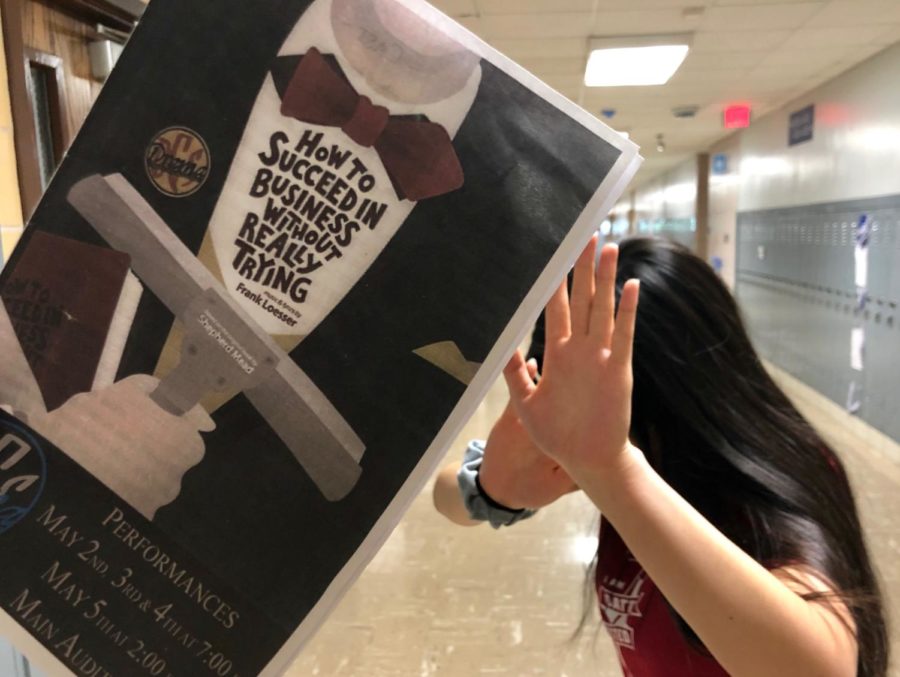How to succeed in business without being sexist
The 2019 DGS musical “How to Succeed in Business Without Really Trying” has many misogynistic themes that should not be overlooked.
The curtain call was met with applause at the 2019 DGS musical “How to Succeed in Business Without Really Trying.”
The musical is based in New York during the 1960s. Finch, a run-of-the-mill, charming man aiming to ascend the corporate ladder, uses a book as a “cheat code” to get ahead in the World Wide Wicket Company. The play is a satirical take on the “American Dream,” proposing the idea that anyone can achieve success in the world of business if they have gusto and luck on their side.
The students had been preparing for the show since late January, and that was clearly evident in their performances. The acting was convincing and the talent exceeded expectations. It was obvious a notable amount of student effort and dedication was put into the show.
However, the content of the play itself is sexist and problematic.
From the mouths of the secretaries cleaning the floors of the World Wide Wicket building, “What the hell!”
From an audience perspective, there were some awkward moments of discomfort resulting from misogynistic jokes and lyrics that did not sit right with viewers. The sexist comments and undertones of the script seemed out of place in today’s progressive society. Not only that, but the writing and direction of the story felt muddled and unorganized overall.
The musical’s narrative revolves in part around the relationship between Finch and his secretary, Rosemary. Despite their innocent and naive roles, the interactions between the two characters were toxic.
One of the first songs of act one is a worthy example of this. “Happy to Keep His Dinner Warm,” sung by Rosemary, depicts her eagerness to provide for Finch at the complete expense of her own self-worth. The song title itself is a damaging reinforcement of sexist stereotypes of the time that actively worked to belittle women.
Additionally, lyrics such as “good evening dear, I’m pregnant, what’s new with you?” suggest that pivotal stages in a woman’s life such as pregnancy don’t hold a candle in comparison to a man’s everyday experiences. The most uncomforting, toxic line of the number came near the end, when Rosemary sang the following lyrics to the audience: “To be loved by a man I respect, to bask in the glow of his perfectly understandable neglect.” These words were upsetting to hear because they normalized acts of neglect in a relationship, especially since Rosemary seemed to be “perfectly” fine with it.
The song intended to be a mockery of these bigoted stereotypes, as the musical has a comedic style that suggests it is not meant to be taken seriously. Unfortunately, the sarcastic intent did not resonate in the context of the script and storyline.
If Rosemary, for example, was able to stick up for herself and gain Finch’s respect by the end of the play, the punchline of “Happy to Keep His Dinner Warm” would have been more justified. This is because Rosemary would show progression as a character as she would overcome her mistreatment and develop into a stronger, more independent woman by the end of the musical. Instead of this satisfactory conclusion, however, Finch’s character is oblivious to his neglect of Rosemary when she tries to address it to him, and she ends up forgetting the issue entirely when he professes his love for her.
Regardless of whether these scenes had comedic intent or not, the relationship was inappropriately romanticized, and there’s nothing funny about it.
Rosemary was also not the only female character to be marginalized, as every woman in the play was discriminated against at the hands of the male businessmen.
Towards the middle of act two, a song performed by most of the ensemble titled “A Secretary Is Not A Toy” was suppose to be funny irony but ending up just functioning as a joke no one laughed at.
In the song’s beginning verses, the male cast sarcastically sings, “She’s a highly specialized key component of operational unity, a fine and sensitive mechanism to serve the office community.” In reality, though, all the male characters view the female secretaries as are “toys” they can operate and take advantage of. This song fails to deliver the irony effectively and leaves yet another hole in the musical’s cohesiveness.
Hedy, one of the main female leads, was the laughing stock of the musical. She was defined solely by her many inappropriate outfits and tendency to lean on men for their power and wealth. Because of her easily influenced nature and ability to attract men because of her features, she was generally used a lot and seen as an image that all of the men lusted over.
Even when Hedy does start to become more independent by proclaiming she was going to leave the company and return to her old job, she is stopped by a man saying he couldn’t live without her. This is yet another instance of how the musical tried to highlight the fact that it is the women who lean on the men and that they are too weak to understand their own emotions.
Despite all of this, DGS has put on amazing musical productions. Last year’s “All Shook Up” was one of the best the program had to offer. This year fell short not because of the production, acting or singing, but because of the musical’s ability to make your jaw drop — but not in a good way.
We applaud the DGS program for attempting to make the story less offensive by using ad-libs and cutting some controversial lines to take away from the overwhelming amount of misogyny in the original script. But although the student effort made to combat the sexist themes of the play is appreciated, the problem is the premise of the play and how it was chosen to be performed at a high school in the first place.
Despite this, it is clear that the students’ values do not reflect those displayed in the play. The DGS drama and theater program tends to be accepting and educated when it comes to putting on shows and this one mistake is not representative of their beliefs.
Being a part of the audience, we expected a finale that would compensate for the sexist remarks by demonstrating an ending that reflected growth from the misogynistic attitude of the musical. But the only time we got equality was at curtain call when Finch gave Rosemary a moment to bow in front of the audience.
More of this representation throughout the musical would have given the show further depth, plot and allowed the drama to portray a message through the hardships of sexism in the 1960s. It could have touched on the attitudes of men and women and the push that was needed to gain equality between them.
You never know, maybe Finch would have picked up a book titled “How to Succeed in Business Without Being Sexist,” and that would have been a great show.














Gloria • Sep 23, 2020 at 7:36 am
Oh, Myron. The irony is real here. You are clearly upset by this article as to leave a snowflake and sexist comment. It is clear who the real snowflake is here. (hint: It isn’t the author of this article)
Myron • Jun 3, 2019 at 7:16 pm
Imagine being so upset about a music you write an entire article about it. While you used the word “satire” in the article, it is evident you have no idea what the word means.
Living your life must be absolutely exhausting, seeing as you most likely find something to be offended by with everything you encounter.
I will say, however, that it must be quite nice to be a snowflake as the weather gets hotter. I hope it makes your Summer more more tolerable.